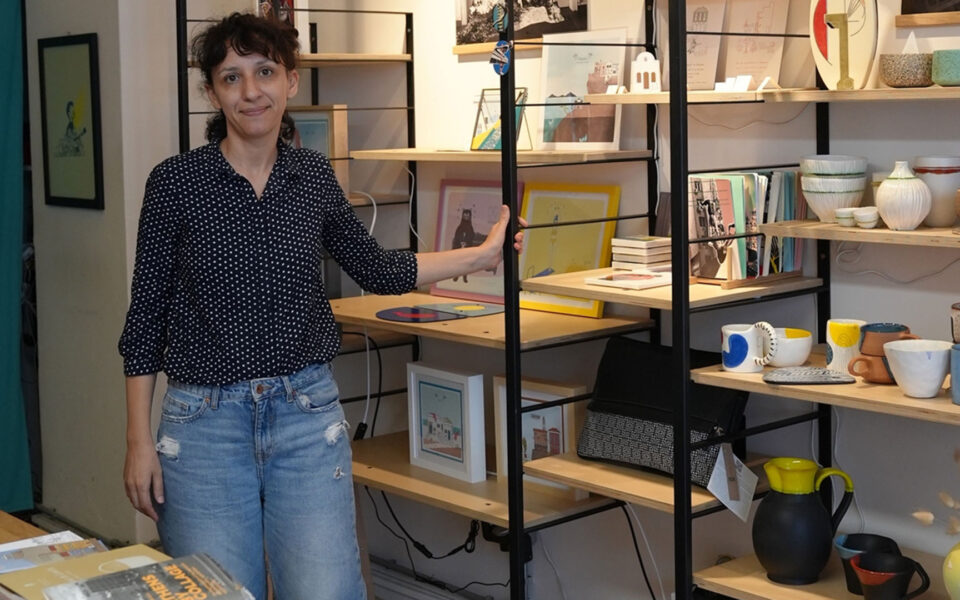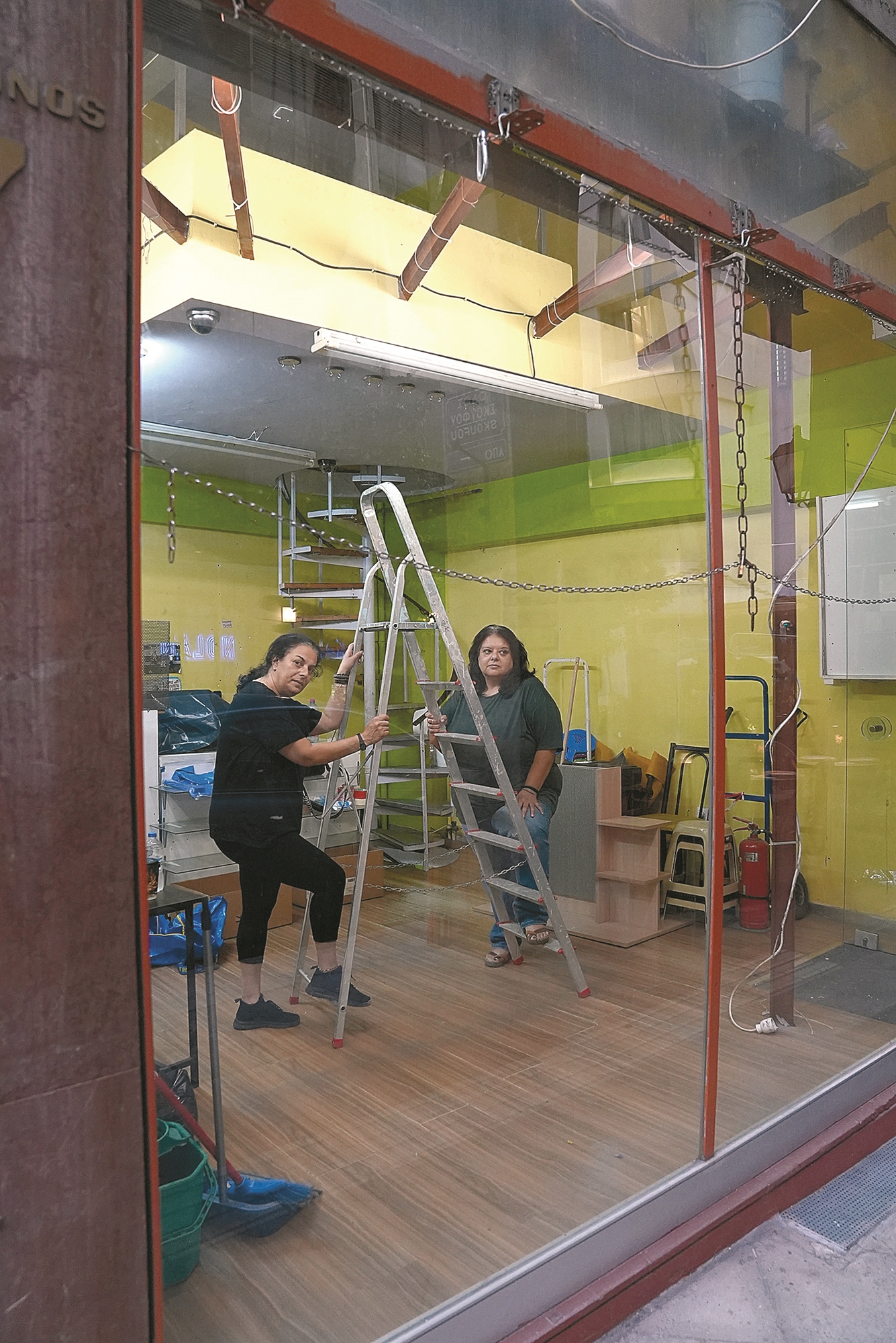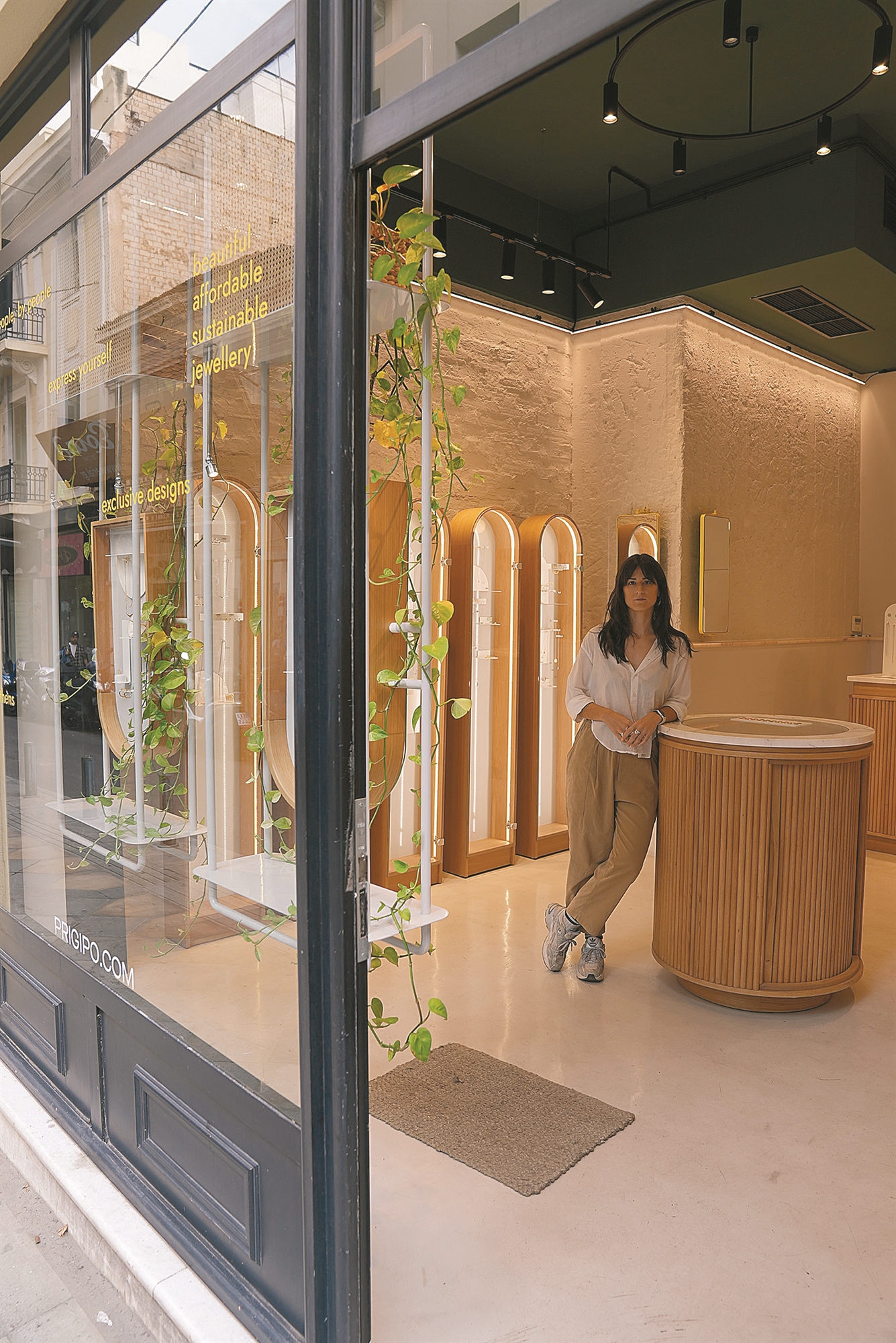The disappearance of Athens’ Commercial Triangle
Small merchants tell Kathimerini how the rent boom has driven them out of the center or threatens to, as restaurants and Airbnbs take over

The Commercial Triangle of Athens is defined as the central area of the Municipality of Athens, flanked by Stadiou, Mitropoleos and Athinas streets, with the vertices of the imaginary “triangle” being Syntagma, Monastiraki and Omonia squares. In addition, it includes the squares of Klathmonos and Kolokotronis on Stadiou, as well as Kotzias Square on Athinas. It became known as the Commercial Triangle as it is where most of the city’s shops used to be located, often clumped together, with fabric and linen shops side by side in one part and hardware stores in another. However, in the years since the economic crisis and the pandemic, these traditional merchants have found themselves gradually being pushed out.
Agathi Arseni suddenly found out one morning that she had only three months to leave the space that for 12 years had housed her shop on Apollonos Street, a few meters from Syntagma Square. At “O,ti Thes, to ‘Cheis” (Whatever you want, you’ve got it) you could find, as the name suggests, everything. Arseni, having listened to the needs of residents and tourists alike, sold everything from cosmetics and phone chargers to Christmas carol triangles and even had a popcorn machine.

The neighborhood kids called it a “mini Jumbo,” comparing it to the huge Greek chain selling everything from toys, baby items and seasonal items to decorational items, books and stationery, and Arseni and her sister, who helped her, were in a way a reference point. Open from early in the morning until late at night, the two women would usually sit on two stools outside the store, coffee mugs in hand, and greet anyone who passed by, often by their first names.
In truth, when the property owner called her with the “bad” news, she wasn’t surprised. Her contract had long since expired; he would not agree to renew it. They did of course agree on rent increases, from 700 to 1,500 euros in the years after the pandemic. He also knew that there was huge interest in the property, especially from restaurateurs. One such proposal was accepted by the landlord. Arseni asked what rent they were going to pay in case she could manage to keep the shop for a few more years so she could sell her merchandise. He didn’t even tell her. Since then, she has learned from neighbors that in addition to the rents going “wild,” the “premium” has returned when you want to close a deal. That is an extra one-time payment on top of the agreed-upon rent. The landlord obviously knew there was no way she could afford it.
A local for 50 years
‘Those of us who are in rental agreements live with insecurity. We feel the pressure and it’s disheartening because the prices are unaffordable. I don’t know what product you can sell to be able to afford it,’ says shop owner Kalomira Papageorgiou
This was the neighborhood she had grown up in. Her father had opened William of Orange, one of the first burger and pizza restaurants in Athens, on the same street in 1972. Arseni and her two sisters grew up there, often sleeping in the store’s loft. They remember Giannis Poulopoulos singing at the Lego Taverna on Nikis Street in the years when the neighborhood had a bakery, a butcher and a fishmonger. Now, apart from the grocery store, store after store has changed use. In this neighborhood alone, over 15 restaurants have opened in recent years.
Late last August, Arseni lost her father and asked the owner for an extension. When he didn’t give it to her, she also felt that the time had come to leave and started to organize the move. She went to the traffic police to get a permit. She was told she needed to apply to the municipal police as well. But there she was told that the time she had chosen to avoid disturbing traffic (after midnight) was a time of quiet. When she heard that, she lost her temper. “Everyone in the neighborhood keeps complaining about the music. A patrol car drives by, the music gets turned down and then it gets turned up again,” she explains.
She also struggled for years to get a permit to put an awning on her shop, at a time when she saw restaurants around her doing outdoor construction and filling the sidewalks with tables. “I ended up feeling like a second-class citizen. Even though it was my second home, on a street I loved, I leave with bitterness,” she tells Kathimerini. She recently stopped looking for another shop downtown. She decided to move to Amfilochia in Western Greece, where she is originally from.
On the day she handed over the keys, just a few meters from her shop, the five women who had set up the Contrust Collective had also started packing up. They had set up their space on the ground floor of an apartment building in early 2018. They shared expenses and shifts and sold items of their own and those of Greek designer friends. When the property was sold, the new owner wanted to use the space differently – they were not given the opportunity to make an offer either. They started looking for other properties in the neighborhood, but the first search was disheartening: 15 square meters without a toilet for 1,800 euros per month. They remained optimistic because some properties they had seen in 2018 were closed. They contacted them, but were surprised to see that even for those, the rent had almost doubled. Eventually they moved to Kypseli.
Search
The owners of the Prigipo jewelry store did a similar search in the last six months in the streets around Ermou, which runs from Syntagma Square all the way down to Monastiraki. Those streets are traditionally where all the silversmiths had their workshops. “We felt that all this would also knock on our door at some point. Three of our close associates had been forced to leave the area recently,” says Kalomira Papageorgiou, owner and co-founder of Prigipo who started making jewelry as a hobby in 2004 and managed to create a company with 18 employees. Initially from their home, then in a small workshop on the third floor of an apartment building in Syntagma and, in 2020, in their first shop on the ground floor of a building on central Kolokotronis Street, which they renovated – and are still paying off the loan.

The building was sold last summer and the new owner, from Israel, intends to convert it into short-term rental apartments. “Our goal was to have a healthy business. To create nice affordable things without a lot of stress. This business is definitely not suited to changing locations every so often,” she explains. Aside from the arduous search process, she is also trying to manage the guilt she feels for agreeing to sign a three-year contract knowing that the owner intended to sell. Of course, other business owners who spoke to Kathimerini confirm that a three-year contract is now a common thing that they are often forced to sign. “Those of us who are in rental agreements live with insecurity. We feel the pressure and it’s disheartening because the prices are unaffordable. I don’t know what product you can sell to be able to afford it,” notes Papageorgiou.
At the end of the year, another hardship hit them: At dawn on December 29, a thief managed to get into the store and empty their drawers. That morning they gathered and brought down to the shop what jewelry they had in the workshop on the second floor, put on loud music, cleaned up the material left by the police and tried to end the year with a smile. At least they had just found a new home. Their workshop will have to move farther away, to Patission, but soon they will open their new shop in Praxitelous. They wanted to stay in the area. “But how long will the Commercial Triangle continue to be called that? Who will see the soul of the center that we love again if everything becomes a restaurant or an Airbnb?” she wonders.





